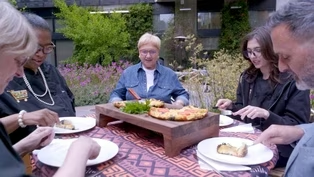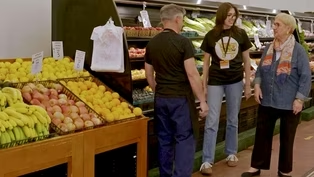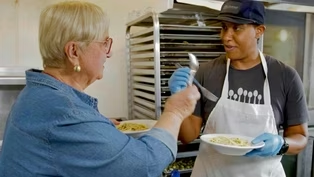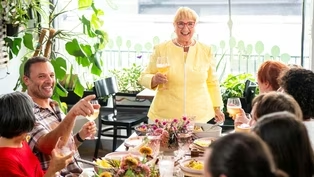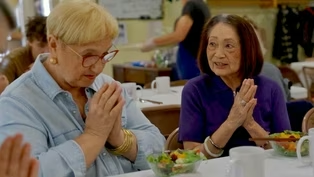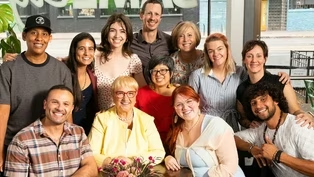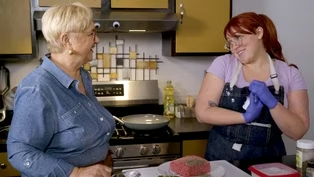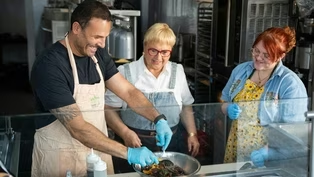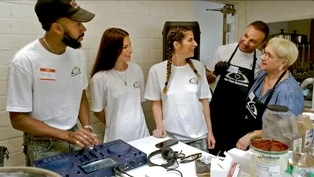Lidia Celebrates America
Lidia Celebrates America: A Nation of Neighbors
Season 2025 Episode 1 | 55m 45sVideo has Closed Captions
Lidia Bastianich honors America’s volunteers, revealing how giving back unites and uplifts.
Celebrity Chef Lidia Bastianich travels America to honor volunteers who form a “nation of neighbors.” This special spotlights those giving time and care—especially through food—showing how sharing meals and fighting hunger unite communities, strengthen bonds, and enrich lives through acts of generosity. Watch 'Lidia Celebrates America: A Nation of Neighbors.'
Problems playing video? | Closed Captioning Feedback
Problems playing video? | Closed Captioning Feedback
Funding for LIDIA CELEBRATES AMERICA is provided by the Corporation for Public Broadcasting.
Lidia Celebrates America
Lidia Celebrates America: A Nation of Neighbors
Season 2025 Episode 1 | 55m 45sVideo has Closed Captions
Celebrity Chef Lidia Bastianich travels America to honor volunteers who form a “nation of neighbors.” This special spotlights those giving time and care—especially through food—showing how sharing meals and fighting hunger unite communities, strengthen bonds, and enrich lives through acts of generosity. Watch 'Lidia Celebrates America: A Nation of Neighbors.'
Problems playing video? | Closed Captioning Feedback
How to Watch Lidia Celebrates America
Lidia Celebrates America is available to stream on pbs.org and the free PBS App, available on iPhone, Apple TV, Android TV, Android smartphones, Amazon Fire TV, Amazon Fire Tablet, Roku, Samsung Smart TV, and Vizio.
Buy Now
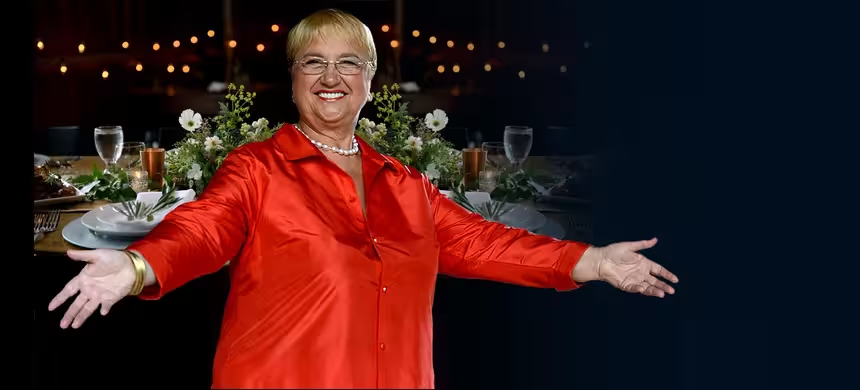
25 Years with Lidia: A Culinary Jubilee
Roll back the years and take an intimate look at the trajectory of Lidia's life both on and off the screen. Delve into her inspiring journey with engaging videos, and meet the remarkable woman whose legacy continues to shine.Providing Support for PBS.org
Learn Moreabout PBS online sponsorshipLIDIA: This year, I hit the road to meet my neighbors across the country.
Mamma mia, this is wonderful!
Incredible people who represent the thousands of Americans who show up every day.
- People who volunteer.
- Give themselves.
- Contribute to the community.
- All their time and effort.
- Go ahead and grab an apron.
- Offering help... - One meal to one person that really needs it.
LIDIA: Comfort... - People just want to belong somewhere.
LIDIA: Empowerment... - Volunteer exchange for a meal.
LIDIA: And connection.
- Remember to eat, and also, I love you.
- Okay, you're hired.
LIDIA: Everyday people, extending their hands, and sharing their tables.
Helping America remain a nation of neighbors.
Give whatever you can.
(laughter) It will come back tenfold.
- Thank you.
- Thank you.
- I love you, bro.
- Thanks, I love you.
LIDIA: Tutti a tavola, a mangiare.
Salute.
Chin, chin!
(table cheering) - Row after row of homes burned to the ground.
LIDIA: Traveling across America today... - That's how quick the water was rising.
LIDIA: It's hard to escape a feeling of uncertainty about the future.
- It was an absolute record-breaking event.
LIDIA: Natural disasters, financial unrest, even loneliness are on the rise.
- Loneliness, a new public health epidemic in America.
LIDIA: From a distance, things may look bleak.
- Sometimes, I feel like I'm-I'm paralyzed.
♪ ♪ LIDIA: But out on the road, I find something else on the rise.
- We're doing meal-planning.
Can I get a raise of hands if you are in the kitchen?
Wonderful.
LIDIA: Volunteerism-- individuals freely committing to making a positive impact without financial reward-- is increasing.
- We're all part of this.
Just one city, one community, one neighborhood.
LIDIA: Transgenerational, great.
(voiceover): I set out this year to celebrate the enduring willingness of Americans to extend a hand to neighbors in need.
- We live in the neighborhood, so we feel like we want to give back to the community.
LIDIA: Building a sense of community physically.
- There's so many possibilities if people and government and philanthropy come together.
LIDIA: Can I get in the kitchen?
- Well, that would be a whole lot of fun.
LIDIA (voiceover): Philosophically... - We have a phrase-- "no saviors, just neighbors."
♪ ♪ LIDIA (voiceover): and now, even virtually.
- I need you to trust me, because I know that you do, right?
♪ ♪ LIDIA: It's benefiting not just those in need, but also the millions of Americans who regularly offer their time, effort, and love to their neighbors.
- This is my ikigai.
"Ikigai" is a purpose in life.
♪ ♪ LIDIA: Join me.
Or, even better, join these volunteers nourishing their neighbors, making connections... - We're neighbors.
We're all together, eating on the same table.
LIDIA: Yes, you are.
(voiceover): And making their communities stronger.
- If we can help others, that's what we have to do.
(applause) LIDIA: One hour, one person, one meal at a time.
♪ ♪ So, one neighborhood at a time.
- One neighborhood at a time.
LIDIA: I travel first to a neighborhood just outside of Los Angeles... ♪ ♪ ...that was recently destroyed by the wildfires.
♪ ♪ - Complete devastation.
Empty lot, empty lot, empty lot, empty lot.
Devastation, devastation.
(sighs) LIDIA: Shannon Thomas drives me through what is left of Altadena.
The neighborhood where she lived really got hit.
The hills that she would run as a young child, a girl, and she says there's no more trees there.
- You can see the mountains.
All the brush is gone.
It's just soil.
(siren wailing, flames crackling) LIDIA: The wildfire ripped through the neighborhood in a matter of hours.
- My family was worried about evacuating.
We were trying to make plans for, how do we get my bedridden grandmother out of the house?
(indistinct talking, flames crackling) - At least ten people have died.
- Destroyed some 7,000 structures.
(flames crackling) ♪ ♪ LIDIA: The scale of the destruction became clear in the days that followed.
♪ ♪ (to Shannon): What was it to see this land where you played, and all that burned, the houses burned?
- It was devastating.
It was incredibly traumatic.
♪ ♪ And then, the next day, I was like, "Okay, it's time to go."
Like, we've got to go find a way to tap in.
♪ ♪ - I'm here in Azusa at Halfsies Snack Shack, and they are running an emergency popup for the first responders, and also collecting goods for everybody that's been, you know, affected by the fires.
- I'd saw on Instagram, there was a place called Halfsies Snack Shack.
So I just showed up, and was like, "Do y'all need help?"
♪ ♪ - We had hundreds of volunteers lined up at 8:00 A.M.
every day, wanting to do something.
LIDIA: Organizing the volunteer effort was Firas Ayyad, founder of a group called No Res Gourmet.
- When something like this on this scale happens, I think people tend to forget any disagreements, realize that we're all part of this, just one city, one community, one neighborhood, no matter how big or small, and they want to go out there and do something to help each other.
- Oh, it was such a beautiful community of people who were, you know, giving 18 hours of their day, seven days a week, to be there for each other and to be there for their neighbors.
LIDIA: Firas started No Res Gourmet in his kitchen in 2019.
♪ ♪ - I got this idea one day that I am going to cook for people that are experiencing homelessness in my neighborhood.
But I wanted to make something that's a little better than your standard donated food.
I wanted something gourmet.
(sizzling) And I went out and handed them out to people in my neighborhood.
People were shocked that somebody took the time to make this food for them, individually, and it just inspired me that this needs to be a thing.
(Instagram message alert) LIDIA: He asked others to join him, and No Res grew quickly.
♪ ♪ - One meal to one person that really needs it, that really appreciates it, you feel that.
More and more people kept showing up.
More and more meals made.
More and more people served.
- Hi, good to see you guys again.
- Good to see you.
- Welcome, welcome.
I see you're on kitchen duty, so go ahead and grab an apron, and then come out and get a nametag.
LIDIA: Months after the fires, No Res Gourmet is still providing meals for their neighbors.
- We're doing a really exciting meal-planning and delivery today for folks who have been impacted by the fires.
If people are displaced for the next 18 months-- that was the estimate from the Army Corps of Engineers-- we're going to be here for the next 18 months, providing food.
Let's do it.
(group cheers) - We'll start it off with-- give me a bottom layer of oil on each pan, Mike.
LIDIA: Okay.
- Then Lidia, I'm going to be giving you the onions.
LIDIA (voiceover): I joined them at a recent pop-up cooking event.
- Coming in.
- Go with the 80-20, because we want that extra fat for the flavor.
LIDIA: We're making 175 five-course meals.
Let's get every little bit here.
Mm, nice smell.
When I entered the kitchen, it was almost like a little beehive.
(upbeat dance music) ♪ ♪ Positive feeling, positive thinking, positive cooking, teamwork, music.
I had fun.
(on-screen): Yeah, I think so.
- All right.
LIDIA: I want to hear some good music.
Get some Italian in there, in my honor, okay?
- In my honor, as well.
- We like to have some music playing, and it just so happens that I know some pretty well-known and good DJs.
LIDIA: I asked them for some Italian music.
How's that?
- Well, they're not that good of DJs.
(all laugh) - You gotta get a little in there.
(upbeat dance music) - When you're cooking, if there's joy in the process... (laughter) ...celebration and dancing, and everybody's having fun, that translates into the food.
You can taste it, you can feel it.
There's joy coming from here.
♪ ♪ LIDIA: You have a great smile.
- (laughs) - Community is that sense of being part of something greater.
Every person who walked in here felt like they were contributing, That they were part of a team.
- When you serve others, you get that feeling of, "Oh, I'm needed.
I matter, I count."
And that, you know, fills people with happiness.
(indistinct chatter) - Everyone gets chicken.
Everyone gets beef, rice, salad.
They get cake.
LIDIA: A few hours later, the meals are ready for delivery.
LIDIA: So is this for six people, I see.
- Mm-hmm, yep, for six people.
and then I'm just confirming it, taping it down, putting labels.
LIDIA: Okay, you put it on top, any place?
- Mm-hmm.
- Then all we do is we put 'em in these bins, and then... LIDIA: Who delivers?
- I myself, and then we've got like, four other drivers.
LIDIA: I met Cisco, a volunteer made homeless by the wildfire.
(to Cisco): I follow you.
- Whoop, whoop, whoop.
LIDIA: You, you lived in the car?
- I'm living in the car right now, yeah.
LIDIA: Is that because of the fires?
- Yeah, yeah.
LIDIA: Oh my goodness.
- Put that one right there, and we're ready to go.
LIDIA (voiceover): Cisco is full of energy.
Somebody's going to be fed.
- Yeah.
LIDIA: When I found out that he himself had lost his home in the fires, and he had the strength, giving all he had, that impressed me.
- I'm not somebody that likes to ask for help, right?
But in my experiences throughout life, love is a state of being, and we all have it.
And it's the tether that keeps us all together, right?
LIDIA: That made me emotional, and moving, and you know, and wanting to hug and thank this young man.
Under this beautiful hair... - (laughs) LIDIA: There's a lot of good thoughts, Cisco.
Continue with that, okay?
Can I give you a big hug?
- Yes, of course.
(laughs) ♪ ♪ At the end of the day, volunteers and community members gather to eat.
- Very good.
LIDIA: Isn't it?
- It's very good.
LIDIA: Delicious, isn't it?
- We have a phrase-- "no saviors, just neighbors."
We're not here to save anybody else.
We're here to walk alongside you as you face whatever it is that you have to face, and you know, lend you a cup of sugar, give you an egg.
(laughs) LIDIA: Did your house burn down?
- Oh, everything, everything.
LIDIA: Oh, my god.
- We're not, you know, solving world hunger in one day, but we are making those micro-connections.
They tried to pay you for the food?
- Yeah, she's like, "We're struggling so much right now, (voice cracking): "And I know it's not a lot, but you're feeding my grandchildren."
- Wow.
That's why we do this man.
- So... - C'mere.
- I love you, bro, thank you so much for allowing me... - I love you.
- That's why we have so many repeat volunteers.
We don't pay anyone.
That's all the payment that you can receive... - Yeah.
- ...is that people really appreciating people.
It's a lot of work, you've seen.
But they keep coming back.
There's something paying them.
- So I'm in there... I'm in it to win it, for real.
- (laughs) - All right?
(both laugh) - Get some food, please.
LIDIA: This is an example of how neighborly America is.
- You see this, there's people from the community, from the local mosque, there's some Muslims, there's Christians, we're in a church, there's Catholics.
LIDIA: This is wonderful.
- We're neighbors.
We're all together, eating on the same table.
LIDIA: This is the world.
- If we've come in with the attitude that we're all the same, at the end of the day, we all experience the same things, we all live in the same city, we're all from the same neighborhood, and whether recipient or volunteer, we see each other on the same level, it begins to cultivate that humanity between us, that connection, that communication.
LIDIA: And food is the ultimate communicator.
Pleasure meeting you all.
- Thank you so much.
- Pleasure meeting you.
LIDIA: Enjoy, thank you.
And you and you continue the good work.
- I hear you like to sing.
Do you want to learn a short call and response?
LIDIA: Sure.
- We're at Echo Mountain, the energy echoes out.
LIDIA: When Shannon asked me if I would sing with her, I was delightfully surprised.
- So, I'm gonna need a beat.
(both clapping) LIDIA (voiceover): She had a special song.
- And we're gonna repeat after me.
♪ Forget your perfect offering ♪ LIDIA: ♪ Forget your perfect offering ♪ - ♪ Just ring the bells that still can ring ♪ LIDIA: ♪ Just ring the bells that still can ring ♪ - ♪ There is a crack in everything ♪ LIDIA: ♪ There is a crack in everything ♪ - ♪ That's how ♪ LIDIA: ♪ That's how ♪ - ♪ The light ♪ LIDIA: ♪ The light ♪ - ♪ Gets in ♪ BOTH: ♪ That's how the light gets in ♪ LIDIA: Whoo!
(voiceover): Music, it sets our mind at peace.
The singing was like a chant to all her emotions, to nature, to her state of being and everything around us, and I could relate to that.
(on camera): Very nice.
Thank you, thank you for teaching me that.
- You're welcome.
♪ ♪ LIDIA: (voiceover): I travel next to meet a woman introduced to me on TikTok.
- And I hit record.
- If this is your first time being poor, I'm Kiki, and I'm using depression, recession, and war time-- ooh.
If this is your first time being poor, I'm Kiki and I use depression, recession, and wartime recipes to keep you fed during whatever this is.
LIDIA: Kiki Ruff is a virtual volunteer of sorts.
- Today, we're going to make an everything chili.
LIDIA: Sharing tips for cooking on a budget.
(pouring sauce, bottle squirting) - (voiceover): Anyone who has told you that chili has rules is a liar and a thief of joy.
(clanking) (strains) ♪ ♪ I'm not a professional chef.
LIDIA: She only started posting videos a few months ago.
- I bought rationing cookbooks, so we could figure out how to cut grocery costs.
LIDIA: But the instructional series she calls "Recession Recipes" struck a chord with hundreds of thousands of viewers, seemingly overnight.
♪ ♪ - Maybe over the course of 72 hours, 150,000 people had followed me, and it was just kind of like this... explosion that came out of nowhere.
♪ ♪ This recipe book... LIDIA: I joined her at her home in Indiana, surrounded by cookbooks from the 1930s and '40s.
- So, the "Searchlight" is really a big guide for me.
I've found most of my recipe guides in there, but when I'm looking at something completely new, I'll start with just the ingredients.
LIDIA (voiceover): She's looking for clues for how to cook in periods of hardship.
- I wanted to see how people were making do in war times and recession and depression, because if they could do it and they could create resources from it, there has to be something there that I can find to teach others.
♪ ♪ LIDIA: The periods of hardship that Kiki is looking to are times that shape how I cook.
- "Searchlight" is '49... LIDIA: Wow.
- Same with the "Encyclopedia Cookery," and this one is actually from 1900.
It was written by a group of women raising money for their first public library.
LIDIA: Oh, wow.
- Yeah.
LIDIA: I watched my grandmother stretch meals during World War II, and learned the art of improvisation working in the kitchen of the school at the San Sabba refugee camp.
To pay for my tuition, I would work in the kitchen.
I felt, "Oh, okay, I am helping to feed somebody."
It began, I think, at that early age, with me and my passion for food.
I was ten years old then.
Kiki, being two generations beyond me, impressed me that she had the foresight to see what those people, when they were in need, how they cooked.
And she sort of revives this and puts dignity in it, you know.
- I looked for goulash recipes here, and then I looked for modern Hamburger Helper replacements.
And I was trying to think of, what is the cheapest thing that people could put in the pot?
LIDIA: My grandmother cooked a lot of those long braising techniques of meat, not so tender.
Goulash, Hamburger Helper.
You sort of taught yourself, you grew into this by need, then by curiosity, then by your wisdom.
- I thought at first I was just making silly cooking videos, and then all of a sudden, I'm seeing how it's affecting people, so I'm leaning in more.
(on TikTok): Now we're moving into different ways to prepare beans, which is going to be a very cheap ingredient for you right now.
This is my most requested recipe, but if you don't have meat or you're not a meat guy, here's some substitutions I recommend... For once in my life, I actually have an onion, so I'm going to slap that in... (voiceover): I do think a lot of people facing food insecurity right now feel very alone and isolated.
What I'm trying to do is make sure that they have the skills to feel normal and feel empowered, even though everything else feels like it's on fire.
If you had to put back the bagels and cream cheese this week, that's fine, because we're gonna make them at home for less than $1.50 each.
LIDIA: Kiki, we're in your kitchen.
We're going to cook.
(voiceover): Kiki offers to teach me one of her favorite meals... ♪ ♪ Ruff Rice, named after her mother-in-law.
- My mother-in-law raised six boys on one income, and this was a staple dish.
So one of the reasons I wanted to make this one is because it's super versatile.
(voiceover): Cooking did not come naturally to me, and it was a lot of growing pains and it was a lot of mistakes, and there were a few kitchen fires.
(gasps) First, I am going to season the meat.
This is actually the only time I wear gloves, because I don't like touching meat.
So we're going to go in first with a bunch of basil.
I wish that I had dried this myself, I think it's more flavorful... LIDIA: Okay.
- But that's what I had access to.
LIDIA: But one substitute could be fresh basil.
- Yeah.
LIDIA: It could be parsley, could be all of those greens.
- Mm-hmm.
And then I'm really going to salt it.
I'm Irish, (chuckling): and I prefer it that way.
LIDIA: Okay, we're in your kitchen.
- And-- yes, correct.
(voiceover): I learned how to cook on food stamps.
When you only have access to things in a food pantry, it removes a lot of autonomy.
Giving people the confidence to take those items and make them into something that they actually really want has-- I've seen such a positive, like, mental shift in a lot of people.
LIDIA: This is a one-pot meal, what everybody loves, right?
One pot.
- Yes, yes.
It means less dishes for you later, it means easier cooking process altogether.
LIDIA: Mm-hmm.
- And with the one pot, too, that's when you can really sneak in those substitutions.
♪ ♪ I think in American kitchens, there's like a fear of spice.
When I look at modern recipes, it's like, "one teaspoon of pepper."
And I'm like, "What is that gonna do?"
LIDIA: Exactly.
- Get in there!
LIDIA: I, I love my spice.
Don't cry for me.
- I'm sorry, I'm trying real hard not to.
LIDIA (laughing): All right, all right.
- (exclaims) LIDIA: Okay, so... - (voiceover): One of the ways that I have tried to eliminate shame in the kitchen is being messy, is the fact that I don't have a plan, that I'm coming in there just as scattered as the people at home watching are.
LIDIA: You know what helps crying?
- Hm?
LIDIA: I'll tell you.
When you cut your onion in half... - Uh-huh?
LIDIA: Put it under the water and just rinse it.
- Okay.
LIDIA: So, let's get back to serious cooking here.
- Okay.
For every one part flour, we're gonna want one big spoonful of butter, like that.
It does give people confidence, because if this crazy, like... disorganized woman in her kitchen can throw something together that actually looks really good, even though she doesn't really seem like she knows what she's doing... that's empowering.
(sizzling) So, this recipe calls for stewed tomatoes.
LIDIA: Uh-huh.
- I don't have stewed tomatoes.
We're going to use pasta sauce, because it is going to do just about the same thing, we're just not going to get our tomato-y texture... And this is when we add in the rice.
(voiceover): Creating the Recession Recipes series was just taking what I knew how to do and giving it to everyone else who is now facing food insecurity, because it's becoming way more widespread.
LIDIA: So, this, this looks pretty good, huh?
- Yeah, it does.
(clanking) LIDIA: Let's let it simmer a little bit.
- I don't have a lot to offer financially for causes, but I can teach, and that's where this all came from.
♪ ♪ LIDIA: You want to put this in?
- Yeah, sure.
LIDIA: Okay.
- (voiceover): There are so many families who check in on me.
LIDIA: Get some more water in here?
What do you think?
- (voiceover): They tell me about how their grocery bill has been cut down, how they've modified a recipe to like it better.
There is one woman who care-takes for her mother.
(message alert) And I've always knocked it out of the park, getting her mom's favorite recipes up, (message alert) and she'll comment and tell me how much I've knocked off her grocery bill.
LIDIA: So, let's taste.
Let's see.
I think the flavoring's fine.
- Mm-hmm.
LIDIA: I don't think it needs any salt, do you?
- I would salt it.
LIDIA: It's your kitchen.
Okay.
I think the rice needs another five minutes or so, for sure.
(clanking) Like that, and let it simmer away.
- Mm-hmm.
LIDIA: And that's that.
- (voiceover): I have another follower who just had a baby, and she talks about what kind of recipes she's used of mine to help adjust to the new cost of a child.
Here you go, Lidia, it's ready.
LIDIA: Wow, it looks delicious.
So, can I serve you some?
- I would love that.
♪ ♪ LIDIA: And then you can invite your neighbors over, too.
There's enough.
- (laughs) LIDIA (voiceover): I get asked a lot of times, "how do you relate?"
I say, "You know what?
I don't see the camera.
"I see my viewers out there.
I see who I'm talking to."
And I think she does exactly the same.
She bypasses that camera, she talks to her viewers.
- Did you think we'd be here as a society, financially?
Did you think, did you see this coming?
LIDIA (voiceover): And she's sincere about it, and she just goes right through the viewer.
She transcends that lens.
- I have work in the morning, and, right now, I can't sleep because I'm trying to figure out how to make food more accessible.
Even when it's like 10:30 at night, I'm really sweaty, I just finished a video, I don't like how I look, but I put it out there.
And someone says to me, "you fed my family tonight."
That's all I need.
LIDIA: Let's taste it.
Mmm.
(silverware clanking) - (blowing) LIDIA: Delicious.
What's with your mouth?
- It's hot!
(laughing) LIDIA: You're too sensitive.
- (muffled): I know!
LIDIA: You gotta learn how to handle this stuff.
- (laughing) LIDIA: Spread it out... - Okay.
LIDIA: ...and eat from around, that's where it cools off.
- Oh... LIDIA: Okay?
And then give a little hoo-hoo.
- Hoo-hoo.
LIDIA: You've got it.
(both laugh) (silverware clinking) - Okay.
Mm-hmm.
LIDIA: Great recipe.
- Thank you.
LIDIA: Great, straightforward, simple, very versatile.
It is what you are, Kiki.
This is what you do.
So, I congratulate you.
- Thank you.
LIDIA: And continue in your path.
- Thank you.
You and the onions are gonna make me cry today.
Please remember to eat!
And also, I love you.
♪ ♪ LIDIA: I travel next to Denver, Colorado, to check out a restaurant called SAME Café.
SAME, which stands for "So All May Eat," is a participation-model cafe, operating on the belief that there is more than one way to pay for food.
- And you know that we do the thing that you can volunteer for your meal if you want, or you can pay?
- I just did, I just did my volunteer work.
- Oh, you already did your volunteer work, okay, perfect.
LIDIA: Guests can donate their time, money, or produce in exchange for their meal.
(indistinct chatter) - Somebody called out a sampler.
- Okay, sampler to go.
Thank you so much.
- I do a mix of volunteering and a mix of paying for my meals, depending.
This is an environment where everybody is welcome, and there is no sense of class.
- Can I get you something to drink today?
LIDIA: The cafe has been part of the community for 19 years; a testament to the power of reciprocal relationships.
- The food is... Come find out what the food is like.
- "So all may eat...
free."
Good food.
- Good, healthy food.
♪ ♪ LIDIA: The menu changes daily, a reflection of what produce has been donated, and the creativity of the cafe chefs.
- I did like, a basic melon and quinoa.
These melons, they come from a farm, but they're just so sweet.
- When the chefs come in the morning, they're figuring out what is the menu of today going to be?
They're really being creative, using the abundance of produce that's being donated every day.
- I could probably eat beef stroganoff every day, and I'd be happy.
LIDIA: I want to see for myself how it all works.
- Hi, welcome in.
LIDIA: Hi, how are you doing?
- I'm doing well, thank you.
How are you going to participate today?
LIDIA: You know what?
- Yeah?
LIDIA: I'm a chef, I cook.
How about the first option?
Can I get in the kitchen?
- Oh, well, that would be a whole lot of fun.
You want to do that right now?
LIDIA: Yes.
(voiceover): When they asked me how to participate, of course, for me, was cooking in the kitchen.
You know, this is how I give.
(voiceover): Chef Kim Brazile runs the cafe's kitchen.
I got in and there was Kim waiting for me.
- Does that look good, Chef, or do you want me to chop it down some more?
LIDIA: A little more, but I think it's good.
Good job.
I said, "Let me show you a pasta "that I love that you can cook for your guests here anytime quick when you-- where everything else fails."
Now throw the pasta in there.
(voiceover): We cooked spaghetti, garlic and oil.
(crosstalk) And we'll get back now to chopping.
(voiceover): Here the menu depends on the donated products that they get.
Well, what happens in the winter time when they don't have that beautiful spinach or salad?
(on camera): Kim, throw the garlic in here, I think... (voiceover): Well, I said a little pasta is always good.
(on camera): You like a lot of garlic?
- I love garlic.
LIDIA: All right.
I think you can put a few ladles of water.
Yeah, go ahead.
(fire sizzling, crosstalk) LIDIA: One more in there.
- One more?
LIDIA: Yeah.
- All right.
LIDIA: Let's get the fire going.
And now we can throw in the parsley.
- All the parsley in there, Chef?
LIDIA: I like parsley, and it's good for you.
- Okay.
Yeah, that's what we're all about here.
Healthy food.
LIDIA: There you go.
- Yes.
LIDIA: There you go, absolutely.
LIDIA: The SAME Café offers much more than a meal.
- How often do you actually get a job that you love and you're passionate about?
And I get to connect with my community every day.
It's a good time.
LIDIA: But you give to your community.
- Yes.
LIDIA: This is wonderful.
- Connect and give.
Yes, chef.
LIDIA: And food is a basis.
You give back in whichever way you can.
- Got that hot pan right behind you, chef.
LIDIA: Right, have you, so we should put a little cheese.
Do you like cheese?
- Oh, I love cheese, Chef.
LIDIA: Okay.
(voiceover): But also, it brings people together.
You're accepted in there.
You're part of a team.
(on camera): Flip it.
Flip it.
Also, flip it like that builds the cream.
Flip it, Kim!
- She's saying don't be scared, Chef.
Don't be scared.
LIDIA: No, no.
I'll give a little bit of nice oil.
- I'm afraid to splash you, you know?
You might never come back and see me again.
LIDIA: If you can't take the heat, get out of the kitchen.
- Exactly.
LIDIA: We're in the kitchen.
So, ten minutes, we're done.
- Right.
LIDIA: Saluté.
Thanks, Kim.
- Bon appetit, yeah?
LIDIA: Yeah.
Yeah, buon appetito.
- All right, let's, let's see what Chef's cooking with.
LIDIA: Mm!
- Wow.
That's delicious, Chef.
LIDIA: Right on target.
- All right.
♪ ♪ LIDIA: As it turns out, I'm just one of dozens of people volunteering in the café today.
- Right next to that red one.
LIDIA: And everyone is contributing in a different way.
- When you do 30 minutes of volunteer exchange for a meal, you might be sweeping, you might be chopping produce in the kitchen.
You may be greeting customers, you may be working in our next-door space, helping sort produce.
- Here you go, my friends.
LIDIA: Giving sometimes is much more rewarding than getting, (ice dispensing) And I think that's what people, good neighbors feel.
- Special delivery for you, my love.
- Say thank you.
Say thank you!
LIDIA: Being neighbors and helping each other, this is what America is.
This sense of, I gave, I made somebody feel better, live better, and I helped somebody.
♪ ♪ I travel next to Portland, Oregon, to visit a community lunch program created to provide a safe space for Japanese-American elders.
♪ ♪ - Hey, Lidia, welcome.
LIDIA: Hi, how are you doing?
Just a little something for the club here.
- Thank you.
LIDIA: Thank you for inviting me here.
LIDIA: Now there's Tai chi.
- Yes.
And then what happens?
- So we'll do Tai chi until right around noon, and then everybody will sit down and we'll start serving lunch.
LIDIA: Okay.
Maybe I'll go do some Tai chi.
- Okay, sounds great.
♪ ♪ - "Ikoi No Kai" means place of rest or a place of breath.
Here, I think it's just a place where people can come to be comfortable.
LIDIA (voiceover): What was interesting about Ikoi No Kai is that usually I end up cooking.
But here I was just to enjoy like the rest.
(on camera): All right.
So I said, okay, I can do that.
(chuckles) I always wanted to learn Mahjong, so here's my chance.
- So I'll help Lidia.
- Well, of course.
LIDIA: Today, the Japanese culture that helped shape America's Pacific Coast permeates the center.
But it hasn't always felt safe to be Japanese in America.
- When the Japanese attacked Pearl Harbor, our West Coast became a potential combat zone.
LIDIA: During World War II, the United States treated Japanese-Americans as enemies.
Men, women and children of Japanese descent were forced to relocate to internment camps.
- Military authorities therefore determined that all of them, citizens and aliens alike, would have to move.
LIDIA: Anti-Japanese sentiments lingered for decades.
- After the war, people were coming back to Portland.
So they wanted a safe place where people felt very comfortable being themselves, where they could speak Japanese with one another and hang out.
- People want to be seen.
They want to belong somewhere.
LIDIA: Kristen Dozono's grandparents helped found Ikoi No Kai in the 1970s, and she's volunteered here since she was a teenager.
- I got to wait on my friends' grandparents.
I got to wait on my grandparents.
It was always instilled in me to look after your elders.
We're kind of their home away from home.
LIDIA: After her mom passed away, Kristen's father started coming every day.
LIDIA: So this is grandpa, so come here, sit next to grandpa.
I want to see the three generations here.
He came today, along with her uncle, cousin and niece.
- We come regularly.
LIDIA: That's wonderful.
- 46 years I attended church here.
- Everybody kind of looks after each other here, which is really important.
It's the heart of the Japanese community.
LIDIA: What does it give you?
It gives you, like, connecting with your neighbors... - Friendship.
LIDIA: Friendship.
- A sense of belonging.
LIDIA: Well, this is wonderful.
You enjoy yourself.
Have a good time.
You're waiting for a meal.
I'm waiting for a meal, too.
I'm going to have some.
(voiceover): Five days a week, a paid chef orchestrates a kitchen full of dedicated volunteers.
♪ ♪ - I'm retired-- studies have shown you got to do something or you drop dead.
So I came here and I thought, "Great, learn how to cook Japanese food."
Naomi's got her own style compared to my mom and everything else.
You kind of follow, you go, oh, oh, that's what it tastes like.
- So we made today is a Japanese curry with a chicken cutlet.
To me, that was authentic Japanese food, but sometimes for them it's totally new Japanese food.
So, it's always fun to find out what's new, and what's authentic, and what do they like.
- I've been volunteering here for about a year-and-a-half.
When I'm chopping, like, next to Chef Naomi, it's really intimidating, but I'm like, one day I'll get there.
I'll get, like, as fast as a chopper as she is.
- I retired from the post office, and my friends, they said, "come and volunteer."
I've been volunteering for 11 years here.
- I started volunteering here probably in the 1980s when I was still working.
They needed someone to make dessert once a week.
I do it because I want to continue the feel of the Japanese community.
And I'm learning a little bit of Japanese.
- (speaking Japanese) - For me, it's the crew.
They're really fun, and we have a good time working here together.
- Help!
Uncle!
I don't want to do this anymore!
I can't do this anymore!
Too much onions.
- Right so, this is everybody at the table, let me introduce you.
LIDIA (voiceover): Being served is wonderful, it's always a feeling good sense, you know, somebody cares enough for me.
But it goes beyond that.
The people that are actually doing cooking and serving get that sort of sentiment back, that gratefulness back.
- I love to see people say good meal, everybody compliment me, us, and everyone here is so nice.
♪ ♪ (sizzling) LIDIA: Nice salad.
- Itadakimasu.
Thank you for our food.
LIDIA: Itadakimasu.
- And then you begin to eat.
LIDIA: Okay.
- Thank you.
And if you need it, do you need a fork?
LIDIA: No, if I need help, you're going to help me.
(laughs) ♪ ♪ Okay.
This is good.
So you would go underneath like this?
- Yeah, yeah.
LIDIA: And hold it up?
LIDIA: And I lose half of it, but that's okay.
- Put it in your mouth before it's next to the sauce.
- It's really cool that, like, they've brought everyone together with food.
I've been volunteering here, like, a year, - Same for me, I started last summer.
- It was nice to meet new people and it also, like, had a sense of community, so I was like, I guess I'll come back.
- This is my ikigai.
Ikigai is a purpose in life.
So it's just, I feel more useful for... with my cooking skill and to be able somebody to have a yummy meal.
To me, it's just, like, match made in the heavens.
To be able to work and then make the Japanese food for the senior citizens.
It's just a joy.
♪ ♪ LIDIA: So is this a Japanese dessert?
- It's a strawberry mousse.
- (speaking Japanese) (applause) LIDIA: She's discovering her world.
(voiceover): As I enjoy the meal and the companionship... (on camera): I got a smile out of her!
(voiceover): ...I am struck by how much everyone here actively participates in the give and take of community life.
- Sometimes we think we're doing something for somebody else, but it's really amazing in what you get back.
I mean, sometimes I feel a little undeserving or guilty because there's so much more that comes back to me.
It's kind of unreal.
♪ ♪ ♪ ♪ LIDIA: Next, I head to San Francisco to check out a grocery store where residents can shop for free.
- It's kind of radical thinking for food banks to not just warehouse food but create whole markets where people can come in.
LIDIA: Geoffrea Morris helped make it a reality.
- So this block was totally dilapidated and then the market came and has helped to revitalize a whole block that had once been deserted.
LIDIA: The idea seems simple enough.
- Everything has been community-based.
From the logos to the hanging artistry.
It's all people from this neighborhood.
LIDIA: You pulled it all together.
(voiceover): But it's an entirely new model for food distribution.
- This is where all the magic happens.
LIDIA: Wow.
- This is where legislation turns into reality.
♪ ♪ This market can feed over 4,000 people.
LIDIA: Wow, this is big space, nice and clean.
Smells like fresh vegetables.
Is this what you envisioned?
- This is greater than what I envisioned.
This is 4,000 square feet of free food for the community that needs it so much.
LIDIA: It's called District 10 Market, and it's the first free shopping experience in the country supported by legislation.
- There's so many possibilities if people and government and philanthropy come together.
LIDIA: The City of San Francisco, local non-profit Bayview Senior Services and the community partnering to ensure access to fresh foods in the neighborhood.
- Here in Bayview, there are very few opportunities for people to purchase fresh fruits and vegetables.
LIDIA: Market Director Maggie Shugerman and a small staff run the show.
Purchasing products, managing food donations, and directing the volunteers needed to get the shelves ready each day.
- We get here around 8:00, produce comes in, and then we start filling the fridge and the shelves.
The berries, the apricots, the avocados, the figs, the cherry tomatoes, those are all farm direct from local California farmers.
♪ ♪ On top of that, we work with the local food bank.
We work with a few different food pantries in the area.
When they have extra food, they bring it here.
We're kind of a clearinghouse, which also helps reduce waste and keeps our costs down.
And then we purchase a lot of stuff in bulk so that we can repack it.
LIDIA: The market's regular volunteers make it all possible.
Food, when it's being given or donated, usually whatever they have, you get a box.
But here, everything was lined up just like a regular store.
- Welcome to the market.
Want to give you a little overview of the space and introduce you to the people who make it all possible.
LIDIA: Oh, that's great... - (voiceover): There is not one full service grocery store in the area.
This is the meat and dairy section.
It's not just about not being able to afford food, but the access to food.
I really want to show you our produce aisle.
This is kind of what we're known for.
LIDIA: This is beautiful.
This is beautiful.
(voiceover): Shopping is connecting with the food.
Look at this cabbage.
Great.
You know how you tell a good cabbage?
If it's firm.
- Absolutely.
LIDIA: If the head is firm.
Nice, beautiful.
My best way of cooking is seeing some good products, smelling it, tasting it, sort of feeling it, and then, ah, this is what I'm going to cook with.
- I want to introduce you to Diego over here.
He is one of our longtime volunteers.
LIDIA: Hi, Diego.
Why do you do such a beautiful job?
- We live in the neighborhood, so we feel like we want to give back to the community.
We want to strengthen the community and food is a big, you know, part of it.
LIDIA: Grazie.
- Grazie.
LIDIA: Arrivederci.
- Arrivederci.
- We have about six staff and then the rest of the operation is volunteer-based.
So absolutely crucial to our operations.
We have Caroline here.
- Hi, nice to meet you.
LIDIA: Caroline.
LIDIA: Broken arm and all you-- - And she's still here.
LIDIA: You're still here, huh?
- Yeah.
LIDIA: Hi, Rascoe, how are you doing?
All right.
You're a volunteer here as well?
- Yes, ma'am.
LIDIA: All right, how long is this?
- I've been here two months now in this spot.
LIDIA (voiceover): It always amazes me how many people from all walks of life really give of themselves and want to be part, want to give in some way.
- This is Carmela.
LIDIA: Carmela, como stai?
How did you get involved?
- As a former farmer and as a mother, it makes me feel great.
Because health is wealth.
There is nothing more important.
LIDIA: If we have healthy people, healthy neighborhood, we have a healthy nation.
- That's correct.
LIDIA: All right.
It's all about good food.
♪ ♪ - When it's 1:00 and we're ready for service, we start calling numbers.
- 26!
- Everybody has a card with a barcode on it, so that's going to get scanned.
Then they're going to grab one of our shopping carts and start going down the aisles.
♪ ♪ LIDIA (voiceover): To be able to choose what you want, which vegetable you want with your chicken, which starch you want and all that, it kind of puts you in control, maybe in a situation that you do not have control of your life.
It's very empowering.
Tell me Denise, what are you looking for?
- I'm going to buy some bread.
LIDIA: Bread?
- Whole wheat bread.
LIDIA: Whole wheat bread, good for you.
(voiceover): I followed a mother and daughter and they were making a whole plan of what they're going to cook, who they're going to invite.
- We'll take chicken.
Legs.
- Chicken legs, coming right up.
LIDIA: Oh, that's nice.
- Yes.
Are you going to make two meals, or one meal?
- I'm gonna make a whole meal for everybody.
LIDIA: I love that.
Your neighbors might come over.
(voiceover): And it was satisfying.
It was not unlike, you know, when I shop for the family and whatever, which is deserving of anybody.
- And their last stop in the store is the produce line, because that's the fragile stuff, you want that on top.
It's also the most beautiful part of the store.
We call the refrigerators like, "the crown jewel" of the market.
LIDIA: I'm coming in my zone now.
Tomatoes.
Do you like tomatoes?
- I love tomatoes.
LIDIA: So you can choose four.
- You feel the warmth, you feel the courtesy.
Just because you're poor or in need of help doesn't mean that you don't like people being polite to you and kind to you.
LIDIA: Exactly.
- This is the last stop.
LIDIA: All right, check out.
- All right, let's do it, the produce first.
LIDIA: Produce here.
- Thank you.
- The vegetables and the fruits, we have to weigh out.
LIDIA: So, how many pounds do you sell?
- Right now, it's only 12 pounds.
12.5.
LIDIA: You don't have to move a mountain or make a new city.
Just go to your neighbor in need and help your neighbor in need with a kind word, food, give whatever you can.
It will come back to you tenfold.
LIDIA: Enjoy.
Buon appetito.
- Thank you!
LIDIA: Okay.
This gives them integrity.
- Integrity, dignity, humility, all of those.
- Would you like a box, little lady?
- Our goal is to one day have a commercial kitchen that accompanies this space.
We're looking to expand this in all 58 counties.
Then the reality of the legislation is fully manifested.
- Thank you very much.
LIDIA: So one neighborhood at a time.
- One neighborhood at a time.
♪ ♪ LIDIA: I return to Denver to celebrate the people I've met on this journey.
♪ ♪ First making a stop at the home of Steff Grogan.
I'm here to gather food for the meal I'm hosting with SAME Café.
Wow.
Mamma mia!
- This is my happy place!
LIDIA: Just wonderful.
This is beautiful, this garden.
- Thank you.
LIDIA: And this is supposedly your back yard!
- It is my back yard.
LIDIA: You know, I have a little raised garden, but yours is much better than mine.
She turned her backyard into Blue Shed Urban Gardens.
(on camera): You have tomatoes, zucchini, you have cucumbers.
You have everything here.
So Steff, what do you do with all this food?
- My model is pretty much I keep a third, I share a third with friends and family, and then I donate a third as well.
We provide food for kitchens, like SAME Café, no cost markets, food pantries, LIDIA: That's wonderful.
- Yes.
Here we go.
LIDIA: Steff, the harvest is done?
- The harvest is done.
All yours.
LIDIA: Oh, great, great.
Okay.
- Okay.
LIDIA: Listen, I want to thank you.
What you're doing is wonderful.
Keep on doing it.
You're helping a lot of people out there.
- Thank you, thank you.
LIDIA: Ciao.
- Ciao.
LIDIA: Choosing the SAME Café for our last dinner, I felt that all of these wonderful volunteers around the United States could really come together there to share with each other at that table.
I asked Kiki and Firas to show up a little early and roll up their sleeves and do what they do best.
And it's a great, easy dish.
You can use it in your projects and you certainly can use it in yours.
So peach and beet salad.
Now peeling a peach is like peeling an apple.
You can pull the skin off.
- I've only ever peeled a peach with a potato peeler, I've never done it this way.
LIDIA: Or you can do that.
Just cut the slices right off.
- Wow, that was so fast.
They give so much and so willingly of themselves.
I like the whole beet with the stems.
(voiceover): We pulled dinner together for them to honor them, to thank them.
That's good.
That's perfect.
Throw it right in here.
- How we looking here, chef?
A little bit more?
LIDIA: Uh, yeah, a little more, go ahead.
- Want me to finish the whole thing?
LIDIA: Yeah, so you use everything.
You use the leaves, and the stem.
- I love that.
Waste nothing.
LIDIA: We use the whole beet, that's the beauty of it.
No waste of food.
For me, one way of giving is just teaching and sharing with them.
- This one might need a little choppy-chop then.
LIDIA: Use your judgment.
- Scoop them up.
LIDIA: Yeah, let's scoop them up and put them all in there.
- This is looking nice and colorful now.
LIDIA: Ah, isn't it?
Look at this.
Isn't this inviting?
I wanted to leave something with them... (on camera): You dress it.
(voiceover): ...that they could share with their diners, viewers.
LIDIA: So, you give it a toss.
(tossing) - There we go.
LIDIA: So crumble the little cheese on top.
All over.
That's it.
All over.
- All over.
LIDIA: Uh-huh, all right, guys.
I think we're ready.
♪ ♪ (voiceover): Eating together at the table is one of the most important things that we can do in life.
Whether you are a family, whether you are meeting friends, a table is a great place to enjoy, to have fun, but also to share and to connect with other people.
Wow, what a beautiful table.
Welcome, welcome.
And thank you all for coming.
You came from all over the country.
All of you play a part in this message of really being great neighbors.
So, as we say in Italian, buon appetito.
Thank you for coming.
(indistinct) ♪ ♪ (indistinct chatter, laughter) (voiceover): It gave me a great satisfaction to be at the head of that table.
- L.A., it's a food desert in some places.
You want to go get some good produce, you have to drive really far and pay a lot of money.
LIDIA (voiceover): Seeing all these people so full of energy and exchanging with each other.
- The only issue is, like, the logistical burden because it's hard for the farmers to bring it all the way to us.
- We do a communal lunch program four days a week for seniors.
LIDIA (voiceover): I can see new ideas, new hope, growth, being born at that table, at that time, and just taking off in all parts of the United States.
- I'm going to have so much good stuff to take back and teach with.
I'm really excited.
♪ ♪ LIDIA (voiceover): I think the message here is very simple.
Just being a giving neighbor, caring, giving of oneself if one can, or receiving of others if one needs.
Sometimes, we don't hear enough about these people in America.
There's so many of them out there that are giving so willingly.
Let's increase and let's stay in that spirit.
(laughter) ♪ ♪ (on camera): Wow, wonderful.
I enjoyed this immensely.
So.
Carrie, Casey and Kim.
Thanks to you, you did a wonderful job today.
Thank you for having us.
- Cheers.
♪ ♪ - One, two, three.
(flash bulb) ♪ ♪ ANNOUNCER: Find recipes, videos, and more from "Lidia Celebrates America" at pbs.org/lidia.
This program is available with PBS Passport and on Amazon Prime Video.
♪ ♪
Cooking Frittatas Like a Pro with Lidia
Video has Closed Captions
Clip: S2025 Ep1 | 2m 21s | Lidia visits SF’s District 10 Market and cooks fresh frittatas with local community leaders. (2m 21s)
District 10 Market: Lidia Explores America’s First Free Grocery Store
Video has Closed Captions
Clip: S2025 Ep1 | 4m 45s | Lidia visits District 10 Market, a groundbreaking free grocery experience (4m 45s)
Garlic Pasta at SAME Café: A Pay-What-You-Can Kitchen
Video has Closed Captions
Clip: S2025 Ep1 | 2m 50s | Lidia Bastianich cooks garlic pasta at SAME Café, where meals are earned with time, produce, or pay. (2m 50s)
Gathering Around the Table: Lidia Hosts Volunteers at SAME Café
Video has Closed Captions
Clip: S2025 Ep1 | 2m 44s | Lidia brings A Nation of Neighbors volunteers to SAME Café to connect over food and purpose. (2m 44s)
Japanese Curry with Chicken Cutlet at Ikoi No Kai
Video has Closed Captions
Clip: S2025 Ep1 | 4m 28s | At Ikoi No Kai, Lidia finds comfort, culture, and Naomi’s Japanese Curry with Chicken Cutlet. (4m 28s)
Lidia Celebrates America: A Nation of Neighbors
Video has Closed Captions
Preview: S2025 Ep1 | 30s | Lidia Bastianich honors America’s volunteers, revealing how giving back unites and uplifts. (30s)
Lidia Learns Kiki Ruff’s One-Pot ‘Ruff Rice’ Recipe
Video has Closed Captions
Clip: S2025 Ep1 | 4m 50s | Lidia cooks ‘Ruff Rice’ with Kiki Ruff, sharing tips for confidence and creativity in the kitchen. (4m 50s)
Video has Closed Captions
Clip: S2025 Ep1 | 1m 57s | Peach and beet salad made simple! Lidia teams up with Kiki and Firas for this colorful, dish. (1m 57s)
Serving Dignity: Lidia Joins No Res Gourmet’s Mission
Video has Closed Captions
Clip: S2025 Ep1 | 3m 26s | Lidia joins No Res Gourmet, where they serve dignity, joy, and hope — one meal at a time. (3m 26s)
Providing Support for PBS.org
Learn Moreabout PBS online sponsorship

- Food
Christopher Kimball’s Milk Street Television
Transform home cooking with the editors of Christopher Kimball’s Milk Street Magazine.












Support for PBS provided by:
Funding for LIDIA CELEBRATES AMERICA is provided by the Corporation for Public Broadcasting.
